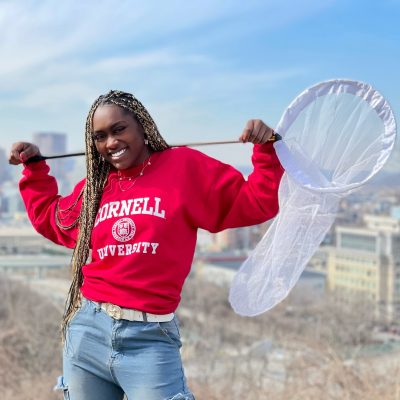Student Spotlight: Sylvana Ross

November 21, 2022
Sylvana Ross is a doctoral student in entomology from Cincinnati, Ohio. She attended the University of Cincinnati as an undergraduate and now studies the genetic variation between urban and natural ant populations at Cornell under the guidance of Corrie Moreau.
What is your area of research and why is it important?
I am interested in understanding how organisms’ interactions within cities influence their ecology and evolution. I am aiming to study the genetic variation between urban and natural ant populations to give insight on the role human driven environmental change has on a population. Specifically, I am looking at how ant species are adapting to cities by looking at how they deal with hotter city temperatures to how populations differ genetically across U.S. cities. It is my goal to use my research to empower empathy for the natural world and intersect social and evolutionary sciences to help advance biodiversity in cities.
What are the larger implications of this research?
As we further understand the gravity of our unbalanced urban ecosystems and lend our hand to the needs of species beyond ourselves, we start tending to the wounds we have created with our concrete. This research aims to aid in the understanding and repairing the consequences of human activity on biodiversity in cities. With rising global temperatures and the inescapable impact of humanity, it is instrumental to understand how some species are adapting to urban areas and how many others are displaced and declining. This is key for creating policy measures to create more environmentally friendly and biodiverse cities.
What does it mean to you to be a Dean’s Scholar?
Being a Dean’s Scholar gives me confidence to believe that I will contribute to innovative research and solutions to Earth’s declining biodiversity. I believe I can wield hope and a promise to the future generation that they belong, without a doubt, within the world of their passions and provide a familiar face within a system not designed for people that look like me. Following footsteps as melanated as mine is like finding prints in the sand, and with an uncertain ecological future, it can no longer be impossible for creative and intuitive minority minds to find belonging within science.
What are you most looking forward to in regards to being a Dean’s Scholar?
I am looking forward to finding community within a space that has historically excluded minds devoted to inclusivity and equity. I am excited to learn of other scholars’ passions and the work they are doing here at Cornell. The past few years for a lot of my peers has been isolating and invalidating, so being able to come together and celebrate our accomplishments and hopes for the future is beyond heartwarming. I look forward to meeting mentors and other senior Dean’s Scholars, as well as receiving the mentoring torch and being an advocate and ally for future scholars.
What are your hobbies or interests outside of your research or scholarship?
I really enjoy trying new foods and cooking. I love to spend time with my cat, Bobbi, and my two crested geckos. I used to run track at my undergraduate college and have been getting back into running, but I also enjoy weight lifting and, recently, boxing.
Why did you choose Cornell to pursue your degree?
I chose Cornell because Corrie Moreau’s lab was so welcoming and her mentorship was highly praised. I know she is a fantastic leader and ally and I feel she would be a great advocate as well as prepare me to be a caring and thoughtful scientist. I love the other grad students within my field and the research being done here is absolutely incredible and fascinating. Dr. Moreau and the field of entomology made me feel that I can belong within this field as a woman of color and as a scientist curious enough to ask questions no one else has asked before.
